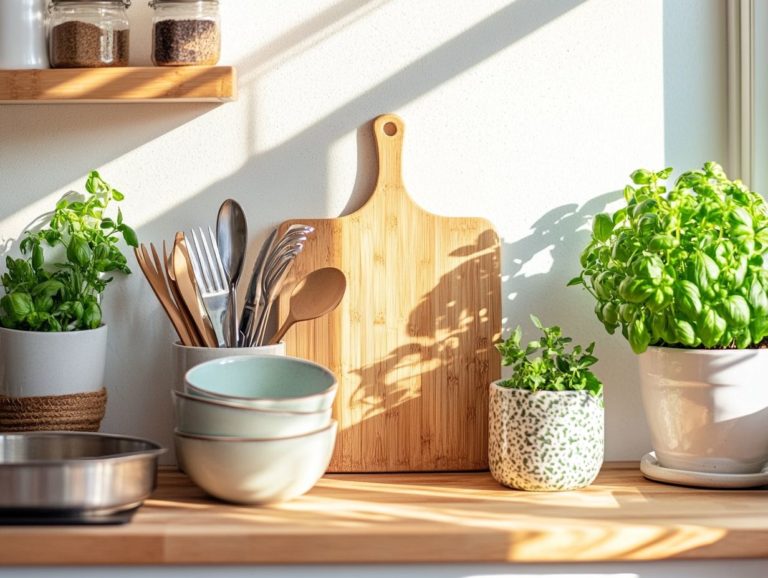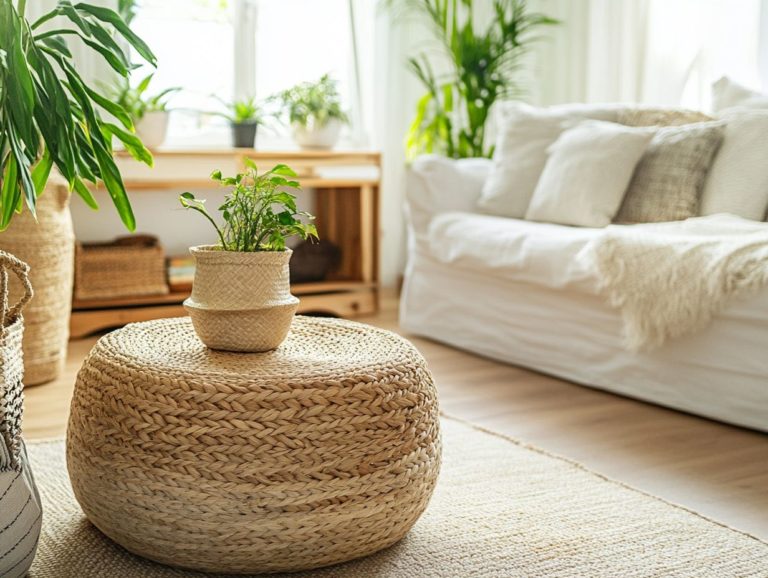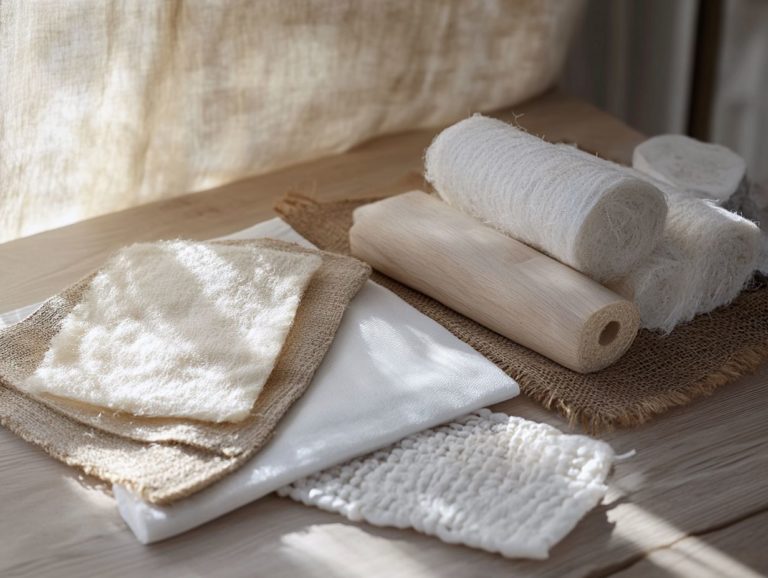5 Essential Sustainable Practices for Homeowners
In today s world, embracing sustainable practices at home has never been more crucial. By reducing energy consumption, conserving water, and managing waste responsibly, you can make a significant impact on the environment.
This article delves into five essential strategies that not only benefit the planet but also enhance your living space and improve your overall quality of life. You ll discover practical tips for monitoring your usage, incorporating sustainable materials, and supporting local agriculture all while keeping your home comfortable and convenient.
Join the movement for a sustainable future now!
Contents
- Key Takeaways:
- 1. Reduce Energy Consumption
- 2. Conserve Water Usage
- 3. Practice Proper Waste Management
- 4. Use Sustainable Materials and Products
- 5. Support Local and Sustainable Agriculture
- Why Is It Important for Homeowners to Adopt Sustainable Practices?
- How Can Homeowners Monitor and Track Their Energy and Water Usage?
- What Are Some Easy Ways to Reduce Energy Consumption at Home?
- How Can Homeowners Conserve Water Usage Without Sacrificing Comfort?
- What Are the Benefits of Proper Waste Management?
- How Can Homeowners Incorporate Sustainable Materials and Products Into Their Homes?
- What Are Some Ways to Support Local and Sustainable Agriculture as a Homeowner?
- Frequently Asked Questions
- What are the 5 essential sustainable practices for homeowners?
- How can I reduce energy consumption in my home?
- What are some ways I can conserve water in my home?
- Why is using eco-friendly materials important for sustainable practices?
- How can promoting biodiversity benefit my home?
- What can I do to reduce waste as a homeowner?
Key Takeaways:
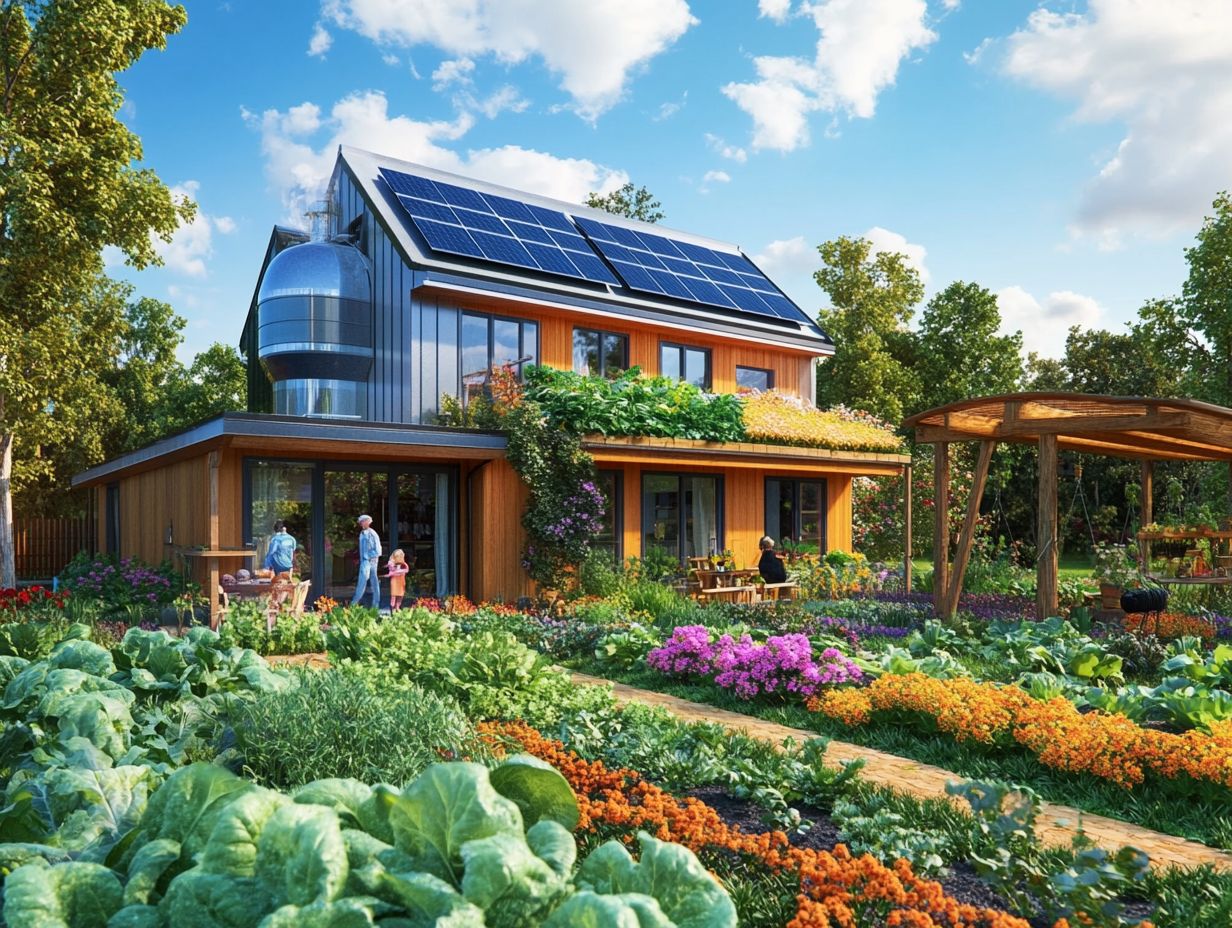
- Reduce energy consumption through simple actions like turning off lights and unplugging electronics when not in use.
- Conserve water by fixing leaks and using efficient fixtures. Consider installing rain barrels or drought-resistant landscaping.
- Practice proper waste management by reducing, reusing, and recycling, as well as composting food scraps and yard waste.
1. Reduce Energy Consumption
Reducing energy consumption is vital for anyone wanting to live sustainably. There are numerous strategies you can implement to achieve this, such as incorporating energy-efficient appliances and smart technology.
For instance, using energy-efficient appliances can cut your energy usage by up to 50%, leading to substantial savings on your utility bills over time. Smart thermostats, which adapt to your individual schedule, can contribute to a 10% to 20% reduction in heating and cooling costs.
You can also switch to LED light bulbs they consume at least 75% less energy than traditional incandescent bulbs and can last up to 25 times longer, making them an excellent investment. Participating in community initiatives like local energy audits and collective solar programs can enhance your efforts, encouraging a culture of sustainability while engaging with your neighbors in the journey toward energy conservation.
2. Conserve Water Usage
Conserving water usage is a vital aspect of sustainable living, enabling you to minimize waste and take care of the environment. By adopting simple yet effective practices like installing low-flow fixtures and engaging in community gardens you can significantly reduce your water consumption while nurturing an eco-friendly lifestyle.
Exploring the advantages of rainwater harvesting systems can truly transform your approach. These systems allow you to collect and reuse rainwater for irrigation or even indoor use, greatly diminishing your reliance on municipal supplies.
Implementing water-efficient landscaping, such as xeriscaping (a landscaping method that reduces or eliminates the need for irrigation) with drought-resistant plants, not only conserves water but also elevates your home s curb appeal.
Beyond your individual efforts, community initiatives play a crucial role in educating residents about these practices, creating a collective impact that enhances the positive effects of your personal actions.
3. Practice Proper Waste Management
Practicing proper waste management is essential if you’re aiming to create an eco-friendly environment, reduce waste, and minimize your overall environmental impact. By adopting techniques such as recycling, composting, and choosing biodegradable packaging, you can contribute to a circular economy while effectively managing food waste and organic materials.
These practices not only help divert waste from landfills but also play a significant role in conserving natural resources. For instance, when you recycle materials like glass, plastic, and paper, you reduce the need for new raw materials, which subsequently lowers energy consumption and pollution.
Similarly, composting your organic waste transforms kitchen scraps into nutrient-rich soil, boosting local gardening efforts and promoting plant health. By reducing food waste through mindful purchasing and meal planning, you actively combat climate change by minimizing methane emissions from landfills.
Ultimately, these waste management techniques pave the way for a more sustainable lifestyle that benefits both you and the planet.
4. Use Sustainable Materials and Products
Using sustainable materials and products is essential for creating an environmentally responsible home. This choice elevates your commitment to sustainable living and supports making informed purchases. By selecting environmentally friendly items and materials with non-toxic ingredients, you have the power to choose wisely, benefiting both your health and the planet.
You’ll find a wide array of sustainable materials at your disposal, including recycled metals, reclaimed wood, bamboo, and cork. These options not only help reduce waste but also minimize your environmental impact. Renewable choices, like sustainably sourced fibers and low-VOC paints which emit fewer volatile organic compounds, making them safer for indoor air quality contribute to healthier indoor spaces.
You can discover eco-friendly products at local specialty stores, online marketplaces dedicated to green living, or by seeking certified brands that prioritize sustainability. By utilizing these materials, you re not just reducing your carbon footprint; you re also infusing your home with unique aesthetics and crafting spaces that are both stylish and responsible.
5. Support Local and Sustainable Agriculture
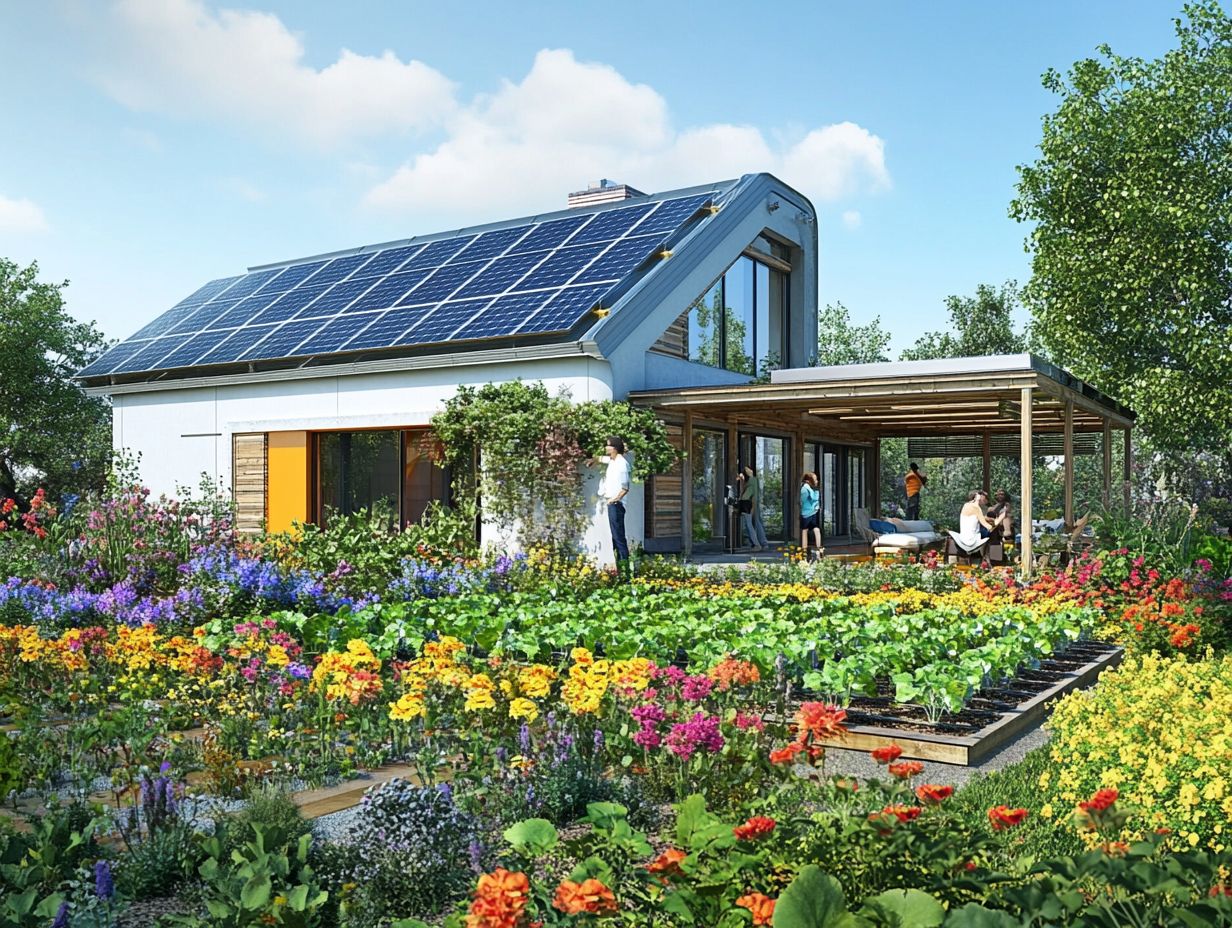
Supporting local and sustainable agriculture is crucial for anyone looking to make a meaningful impact on habitat preservation, promote environmental responsibility, and savor fresh, nutritious foods. By opting to purchase from local businesses and embracing a plant-based diet, you can play a significant role in nurturing sustainable food systems that benefit both your community and the environment.
This commitment not only helps local farmers flourish but also encourages practices that honor the land and minimize carbon footprints. Seasonal produce often has enhanced flavors and superior nutritional value, turning meals into delightful, healthful experiences.
Engaging with local farmers’ markets and community-supported agriculture (CSA) programs allows you to build connections with the food you consume while bolstering economic resilience in your community. These mindful food choices can collectively create a substantial impact on addressing climate change, highlighting the vital role each individual plays in crafting a more sustainable future.
Why Is It Important for Homeowners to Adopt Sustainable Practices?
Adopting sustainable practices is essential for you as a homeowner, not just to lessen your environmental impact but also to play a role in the broader fight against climate change and the preservation of precious habitats. By making eco-friendly choices, you can significantly reduce your carbon footprint and engage in conscious consumerism. For more insights, check out sustainable materials: a guide for homeowners to inspire those around you to embrace similar practices.
The collective effect of these efforts is pivotal in achieving long-term environmental sustainability.
Research shows that if every household made small changes like cutting back on energy consumption or opting for sustainable materials it could lead to a staggering reduction in greenhouse gas emissions by billions of tons each year. For instance, a report from the Global Carbon Project reveals that improving residential energy efficiency could lower global emissions by up to 15% by 2030.
These statistics highlight that your individual actions, while they may seem minor, contribute to a significant movement that enhances community resilience, improves public health by reducing pollution, and creates economic opportunities through green jobs. This interconnectedness aids in nurturing a healthier planet for future generations. It s crucial to take action now to protect our planet.
How Can Homeowners Monitor and Track Their Energy and Water Usage?
You can effectively monitor and track your energy and water usage by leveraging smart home technology and various energy management tools. Embracing these innovations gives you valuable insights into your consumption patterns, enabling you to make informed decisions that promote sustainability and reduce your environmental footprint.
Take smart meters, for example. They provide real-time data on your energy consumption, allowing you to pinpoint peak usage times and adjust accordingly. Smartphone applications offer a user-friendly interface for tracking and analyzing both energy and water usage, making it easy to identify wasteful habits.
Energy-efficient appliances equipped with sensors can also play a significant role by optimizing consumption based on your behavior. Understanding your consumption patterns is crucial. It enables you to implement specific methods for reducing usage, leading to more sustainable living practices and financial savings.
What Are Some Easy Ways to Reduce Energy Consumption at Home?
Homeowners have many straightforward strategies to reduce energy consumption at home. Simple adjustments can save you money while embracing a more sustainable lifestyle. For example, upgrading to energy-efficient appliances and making mindful choices about lighting can drastically cut down on energy use.
Make the switch today to energy-efficient LED bulbs and save up to 80% on lighting costs! Unplug devices when not in use to reduce wastage; even in standby mode, electronics still draw power.
Optimizing your heating and cooling systems by regularly cleaning filters and sealing drafts can lead to significant savings on utility bills. Altogether, these uncomplicated strategies enhance your home s comfort while playing a crucial role in safeguarding the environment.
How Can Homeowners Conserve Water Usage Without Sacrificing Comfort?
You can conserve water usage without sacrificing comfort by adopting smart strategies and modern fixtures designed for water conservation.
Integrate low-flow showerheads and toilets to reduce water flow without compromising performance. This allows you to enjoy refreshing showers and efficient flushing. Optimize your garden irrigation with watering systems that slowly release water directly to plant roots, minimizing evaporation and maximizing efficiency.
Incorporating drought-resistant plants enhances the aesthetic appeal of your green spaces while requiring less water. These thoughtful practices foster a sustainable lifestyle and ensure that comfort remains at the forefront of your everyday living.
What Are the Benefits of Proper Waste Management?
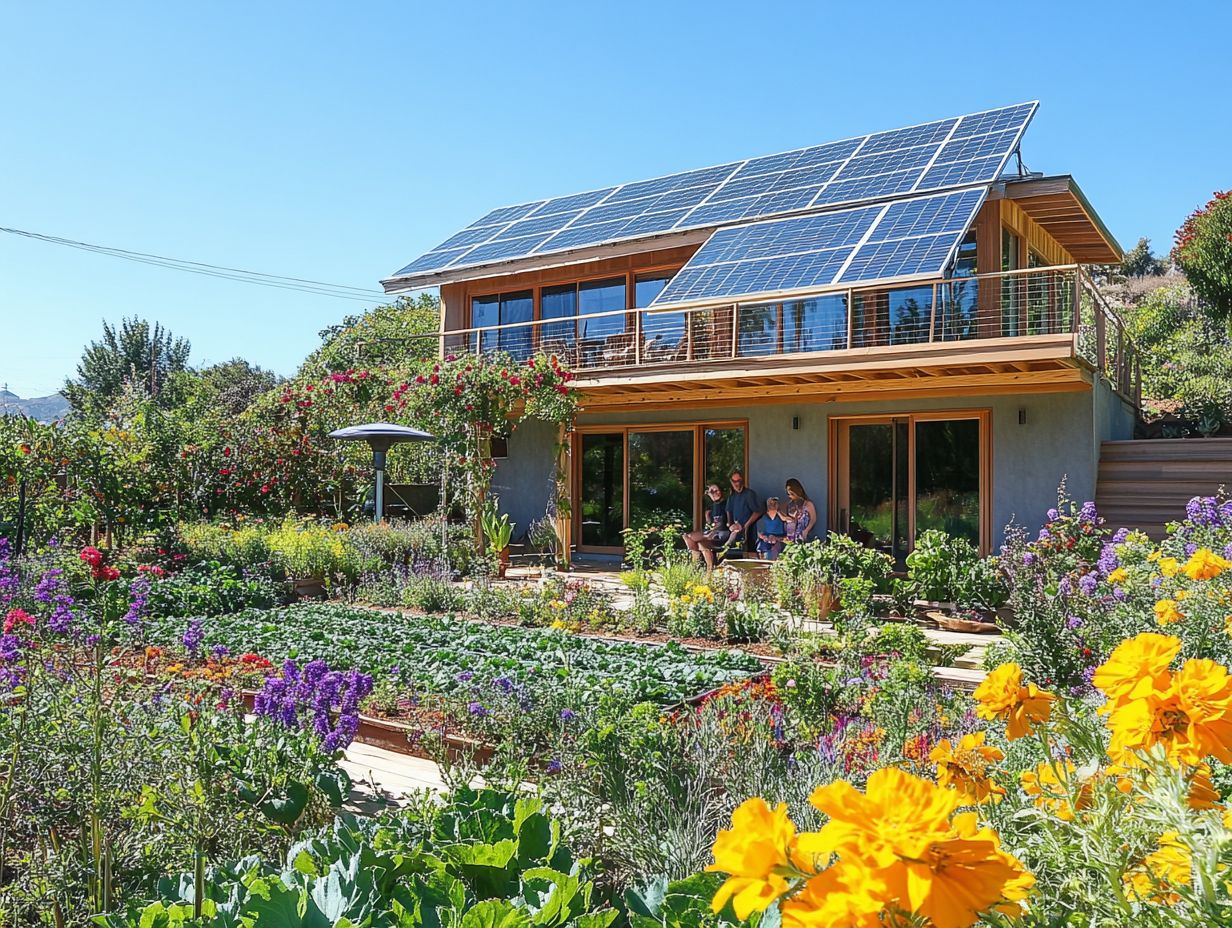
Proper waste management provides a wealth of benefits, including waste reduction, enhanced recycling efforts, and a minimized environmental footprint for your household. Embracing effective waste management strategies helps nurture a healthier planet while promoting sustainability throughout your community.
Engaging in responsible disposal practices reduces pollution levels and leads to cleaner air and water resources. This benefits the ecosystem and bolsters public health, as communities witness a decline in waste-related illnesses.
From an economic standpoint, implementing effective waste management practices can result in significant cost savings for municipal budgets while creating job opportunities within the recycling and waste management sectors.
When you and your neighbors unite to champion sustainable practices, it fortifies community bonds and cultivates a shared sense of responsibility for the environment. This encourages everyone to make more conscious choices, fostering a collective commitment to a greener future.
Join the movement for a sustainable home today! Start with simple changes and explore local sources for sustainable home materials to make a big difference.
How Can Homeowners Incorporate Sustainable Materials and Products Into Their Homes?
Incorporating sustainable materials and products into your home is easy when you make informed choices during renovations and purchases. This approach ensures your living spaces reflect your values that show care for the environment. By prioritizing sustainable shopping and selecting green products, you can significantly enhance your home’s environmental performance.
Opt for reclaimed wood; it adds character and warmth while reducing the demand for new timber. Bamboo flooring is another excellent choice. Its rapid renewability and durability provide an elegant aesthetic and are gentler on the planet. Non-toxic paints offer vibrant color options without harmful chemicals, contributing to better indoor air quality.
Incorporating recycled glass countertops can elevate your kitchen design beautifully while minimizing waste.
Through these thoughtful selections, you can beautify your space and make a meaningful contribution to environmental stewardship.
What Are Some Ways to Support Local and Sustainable Agriculture as a Homeowner?
Support local and sustainable agriculture by engaging with nearby businesses and participating in community initiatives. This helps foster a resilient food system in your area. By choosing to buy locally grown produce and getting involved in community gardens, you contribute to a more sustainable agricultural landscape while enjoying fresh, nutritious foods.
Join community-supported agriculture (CSA) programs that connect you directly with local farmers, providing a steady supply of seasonal produce. Regular visits to farmers’ markets let you meet growers face-to-face and learn about their practices while supporting their livelihoods.
Advocating for policies that favor sustainable farming creates a broader impact, urging governmental support for eco-friendly practices that benefit the entire community. By taking these actions, you play a pivotal role in nurturing a thriving, sustainable agricultural future.
Frequently Asked Questions
What are the 5 essential sustainable practices for homeowners?
The 5 essential tips for sustainable home renovation for homeowners include reducing energy consumption, conserving water, using eco-friendly materials, promoting biodiversity, and reducing waste.
How can I reduce energy consumption in my home?
You can reduce energy consumption by using energy-efficient appliances, unplugging electronics when not in use, utilizing natural lighting, and properly insulating your home.
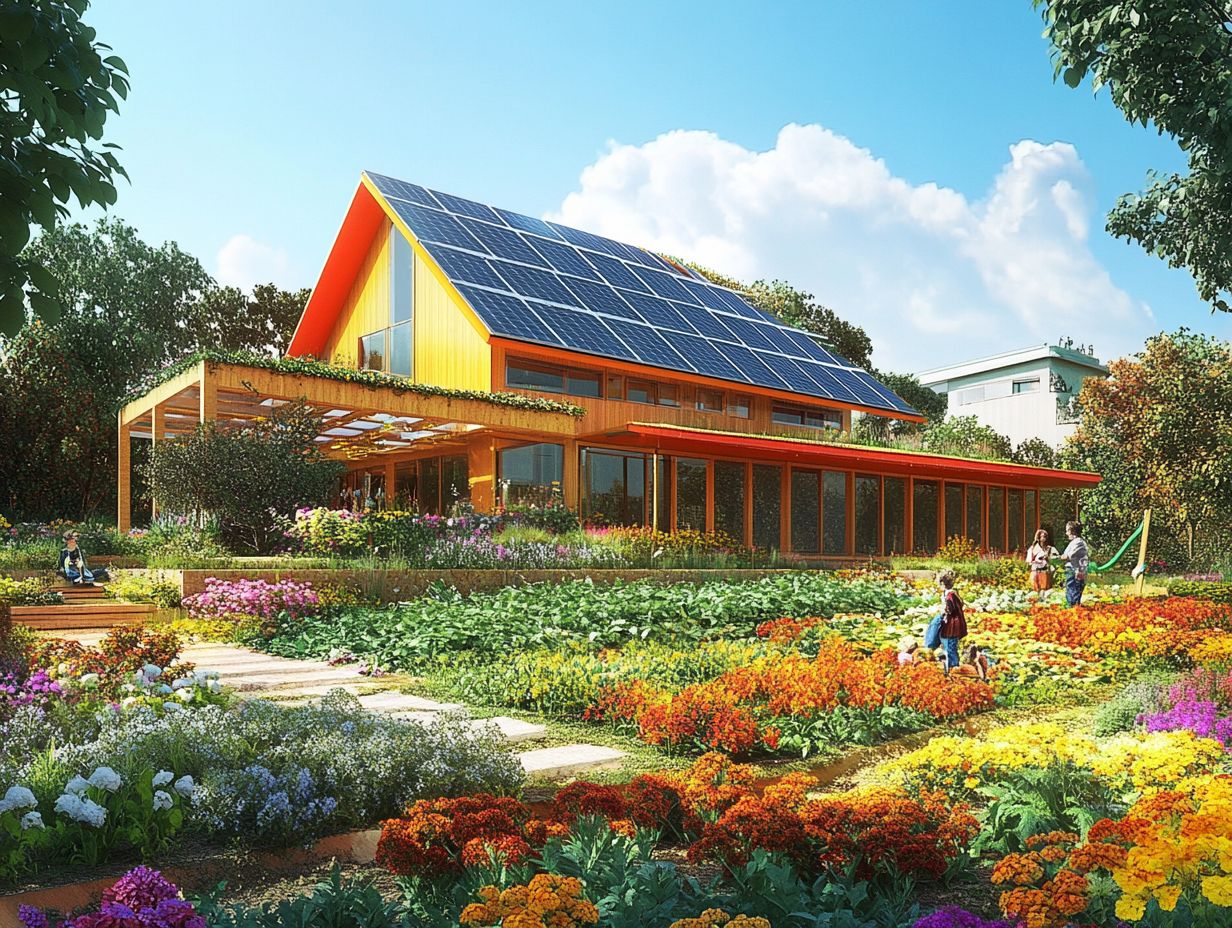
What are some ways I can conserve water in my home?
Conserve water by fixing leaks, installing low-flow fixtures, using drought-resistant plants for landscaping, and limiting water usage for activities like washing dishes and doing laundry.
Why is using eco-friendly materials important for sustainable practices?
Using eco-friendly materials reduces your carbon footprint and minimizes harm to the environment. These materials are often made from renewable resources, having a lower impact on the planet compared to traditional materials.
How can promoting biodiversity benefit my home?
Promoting biodiversity benefits your home by creating a healthier ecosystem, providing natural pest control, and improving the overall aesthetic of your property.
What can I do to reduce waste as a homeowner?
Reduce waste by recycling, composting, purchasing items with minimal packaging, and donating or repurposing items instead of throwing them away. It s also important to properly dispose of hazardous materials to avoid harming the environment.
Explore more tips on how to be sustainable at home and make a difference today!


